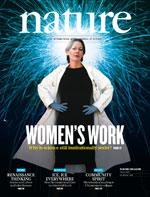NATURE Special Issue: Women in Science
Why is science still institutionally sexist? A special issue of Nature confronts the debates
Though women now receive half the doctorates in science and engineering in the United States, they make up only 21 percent of full science professors and a measly 5 percent of full engineering professors.
Despite some progress toward equity in access to STEM careers, women scientists are still paid less, promoted less frequently, win fewer grants and are more likely to leave research than similarly qualified men. The gender gaps are the subject of heated debates about the relative influence of individual gender differences, e.g., in science aptitude and motivation, and systemic influences, e.g., implicit bias, inflexible work schedules and the long road through graduate school, postdoctoral research positions the tenure track.
A new series of articles in the journal Nature tackles these issues, examining the causes of the science gender gap and highlighting solutions that work. The renewed attention to this issue highlights its urgency. “We are not drawing from our entire intellectual capital,” Hannah Valantine, the Stanford School of Medicine’s dean of leadership and diversity, told Nature, and she asserts “We’ve got to put on the accelerator to evoke social change.”
Issue features:
- A survey of the data reveals where progress has been made and where inequalities still lie, from salary to tenure.
- A news feature reveals a particular dearth of women in some commercial spheres, such as on the scientific advisory boards of biotechnology firms.
- An article by historian Patricia Fara traces the wearying stereotypes perpetuated by the biographers of women scientists.
- An opinion piece by neuroscientist Jennifer Raymond calls on both sexes to recognize and reduce their biases against women in science.
- Eight researchers from around the world offer their prescriptions, from equalizing the retirement age in China, to liberalizing travel restrictions in Saudi Arabia, to boycotting conferences that lack female speakers.
- An exploration of some surprising statistics about mandatory quotas.
- A catalogue of some of the ambitious moves being made in Europe to get more women into top positions.
- Four profiles of successful 30-something women show how ambition and talent can trump obstacles.




